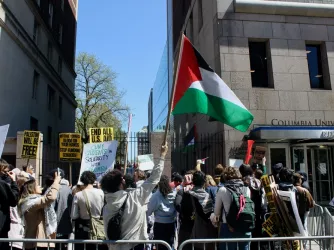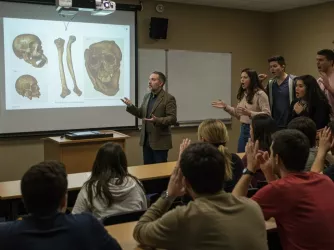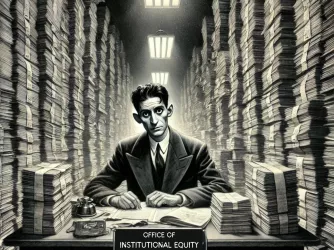Table of Contents
Neither lux nor veritas: Yale pairs speech-protective policies with a culture of intolerance

Yale University campus (Shutterstock.com)
“I hope you, personally, will one day apply the values of intellectual diversity.”
“I’d rather eat shards of glass.”
“Go fuck yourself!”
These were the types of messages that filled my inbox after I emailed half of the Yale student body about a William F. Buckley, Jr. Program event featuring Sen. Ted Cruz. My friend who sent the other half of the emails received similar replies, and students blasted him in Instagram stories. Someone even sent out a mass email with a fake Q&A link and attached his name to it.
Unfortunately, I knew this response was coming. Yale, which this year received FIRE’s ignominious Lifetime Censorship Award, lacks a culture of free expression and willingness to engage with alternative views. Instead, there is a culture of ostracization for offering — not even endorsing — an opposing point of view.
I’m on the student board of Yale’s Buckley Program, whose mission is “promoting intellectual diversity at Yale,” particularly by providing students a space to engage in “serious conservative thought.” I do not in the least consider myself a conservative, but I live for learning from those who think differently than me, so Buckley became a natural home.
The hostility toward the very premise of a program that promotes intellectual diversity points to an impoverished climate for free speech.
Many look at Buckley and assume it’s the campus hub for right-wing fanatics. While many guests of the program do tend to lean conservative, Buckley student fellows come from a wide range of political backgrounds. Fellows and speakers alike are not just willing but also excited to engage in discourse over contentious topics and challenge ideas with which they disagree. I am proud to be part of the student board, but I rarely name-drop the program and tell new acquaintances about my involvement because I know the response I’ll get. The hostility toward the very premise of a program that promotes intellectual diversity points to an impoverished climate for free speech and refusal to even consider alternative viewpoints.
How can we restore a culture of free expression — the key component of academic and intellectual exploration — at Yale?
I am not an expert on the First Amendment, higher education, or the philosophy of free expression. But I have seen social outrage unleashed on multiple friends and have come close to experiencing it myself. The Yale community has a fundamental misunderstanding about the meaning and value of free expression, and our institutions of higher education deserve much of the blame. Yale needs to live up to its motto of “lux et veritas” — it must provide the light in order to help students find the truth.
What’s the light that Yale should provide? Education. That is, after all, the purpose of institutions like Yale. The university has a responsibility not just to educate us in our chosen disciplines, but also to foster an environment for the pursuit of knowledge. This inherently involves protecting students’ expressive freedom, but that protection is effective only when students are educated on the value of free speech and open discourse in higher education.
Yale needs to live up to its motto of “lux et veritas” — it must provide the light in order to help students find the truth.
Students cannot be expected to arrive on campus with the skills to handle tough conversations and to engage with views they find wrong, misguided, or downright offensive. Yale prides itself on admitting students of all different backgrounds, and it is unfair to assume that everyone is well-versed on the essentiality of free expression and civil discourse. In the same way that Yale shepherds first-years through dormitory, drug and alcohol, and plagiarism policies in order to ensure a common understanding of those policies’ importance, the university should take steps to build a common understanding of the value of free expression among students from the outset of their time at Yale.
Yale can start by providing a forum for meaningful discussion about the Woodward Report, a document Yale released in 1974 on the state of campus free expression following a series of university disinvitations and disruptive student protests that shut down academic dialogue. The Woodward Report powerfully details Yale’s responsibility to provide spaces for free and open discourse — even when the ideas presented are unpopular — and is the gold standard for the promise of free expression in higher education.
Yale’s official policy on free expression derives directly from the Woodward Report. The policy states, “Even when some members of the university community fail to meet their social and ethical responsibilities, the paramount obligation of the university is to protect their right to free expression.” The policy acknowledges that unpopular viewpoints exist and that censorship is not the answer. Current leadership seems to understand the truth of those propositions — the report was the subject of President Salovey’s first-year welcome address in 2014.
However, welcome addresses only go so far. In the last academic year alone, Yale tried to compel a student to apologize for sending a party invitation that used the term “trap house,” administrators stood idly by while protesters severely disrupted a law school panel about free expression, and Yale’s lawyers suggested that the Woodward Report isn’t “a set of contractual promises,” despite the official free expression policy adopting the report’s exact words.
Critics of the Woodward Report claim the university has a responsibility to shape the moral foundations of its students and believe an emphasis on free expression will interfere with that purpose.
Students can develop their own moral foundations without the university deciding for them what’s right and what’s wrong.
I’m confident that students can develop their own moral foundations without the university deciding for them what’s right and what’s wrong. Students can — and should — decide what they believe and value for themselves through open and honest discourse in the classroom and their suites. But this cannot happen until students understand how essential free expression — and a willingness to expose themselves to diverse views and challenge their own assumptions — is for developing character, strengthening their own viewpoints, and gaining knowledge.
If we as students have a common understanding of why free expression is valuable, we will naturally learn from each other — not to mention from professors, scholars, and guest speakers all over campus — which ideas are “good” and which ideas are “bad.” With open minds, we will debate, discuss, challenge, and criticize each others’ ideas in order to reach the best possible understanding of important issues, bringing us closer to finding the truth.
A university whose mission is “improving the world … through outstanding research and scholarship, education, preservation, and practice” can only achieve that if students can offer ideas without fear of ostracism and can recognize the value of productive discourse, especially with people with whom they disagree. Yale has accomplished this before — it just needs to get back on the path it first set out on nearly 50 years ago.
Libby Snowden is a rising junior at Yale University and a FIRE summer intern.
Recent Articles
FIRE’s award-winning Newsdesk covers the free speech news you need to stay informed.

UPDATE: Another federal appeals court backs academic free speech for public employees

Feds to Columbia: ‘You want $400 million in contracts back? Do this (or else)’

A picture is worth a thousand words — unless a college district bans it
